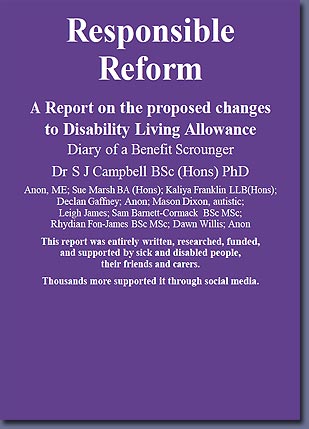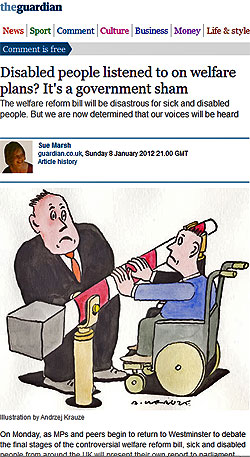Spartacus Report Into Disability Benefit Reform Supports CWU Disabled Members
CWU members involved in campaigns against the government's attack on disability benefits will find today's new report by disability groups and supporters, enlightening and supportive.
Dubbed as the Spartacus Report on Twitter The new report published today (9 January), Responsible Reform, suggests that the government’s DLA consultation breached the government’s own code of practice and was “highly misleading”.
 The report finds that Government misled MPs and Peers over the hostility to disability benefit reform. It finds that Parliament has been given only a partial view of the overwhelming opposition to the Coalition’s planned reforms of a key disability benefit, Disability Living Allowance (DLA). It finds that this opposition was previously not released to public scrutiny by the Government.
The report finds that Government misled MPs and Peers over the hostility to disability benefit reform. It finds that Parliament has been given only a partial view of the overwhelming opposition to the Coalition’s planned reforms of a key disability benefit, Disability Living Allowance (DLA). It finds that this opposition was previously not released to public scrutiny by the Government.
Researchers have used the Freedom of Information Act to obtain more than 500 responses to the consultation that were submitted by disabled people’s organisations, disability charities and other groups – including the response submitted by Boris Johnson – and have carried out the first detailed, independent analysis of those responses.
It is based on the responses to the government's own consultation on its planned DLA reforms, which were only made public once disabled people requested them under the Freedom of Information Act. Findings included:
- 98 per cent of respondents objected to the qualifying period for benefits being raised from 3 months to 6 months
- 99 per cent of respondents objected to Disability Living Allowance no longer being used as a qualification for other benefits
- 92% opposed removing the lowest rate of support for disabled people
In all three cases, as well as many others, London’s Conservative Mayor, Boris Johnson also objected to the proposed changes. He said in his response:
“The Mayor would call for the Government to retain the three-month qualifying period as the increase to six months will mean that people with fluctuating conditions have increased difficulty meeting the qualifying period. People with fluctuating conditions face the same barriers that all disabled face in relation to higher costs of living and DLA is essential to maintain a decent quality of life.”
“We would recommend that the passporting system remains the same as under DLA as it has worked well when signposting people to additional benefits to which they may be entitled.”
“The Mayor does not support this change, as those on the lower rate care component may have additional costs as a result of their impairment but may lose their access to this benefit as part of the proposed removal under the reforms.”
The Mayor also objected to the government's strategy for clamping down on disability benefit fraud, arguing:
"The government proposes imposing penalties if disabled people do not inform the government in changes in their circumstances. However, the Department of Work and Pensions statistics give the overall fraud rate for Disability Living Allowance as being less than 0.5%. For those with fluctuating conditions asking them to report every change to their condition would prove very stressful."
The Mayor’s views were representative of the overwhelming majority of responses to the Government’s consultation..
The analysis showed overwhelming opposition to replacing DLA with a new Personal Independence Payment (PIP). The government also plans to cut spending on DLA/PIP by 20%.
The new report has been researched, written and funded by sick and disabled people, thousands of whom contributed to the research through their use of social media.
Its authors now hope to use the report to persuade members of the House of Lords to back an adjournment debate calling for a pause of at least 6 months. In that time, plans for PIP should be reconsidered with the views of disabled people properly taken into account.
 Sue Marsh, the disabled blogger and activist who led the research, alongside Dr Sarah J Campbell, said:
Sue Marsh, the disabled blogger and activist who led the research, alongside Dr Sarah J Campbell, said:
“For some years now, poorly designed Social Security reforms have created a “trust deficit” among disabled people towards government.
We believe that reform must be measured, responsible and transparent, based on available evidence and designed with disabled people at the very heart of decision-making. Currently, we do not believe this to be the case."
Sue continued:
“While disabled people welcome reform of DLA where it will simplify the system and better support their needs, they do not want a new benefit. They believe it is a costly irrelevance during a time of austerity.
“We urge members of the House of Lords – across party political boundaries – to take note of this research and the strength of opposition to the proposals. It is not too late for them to halt these deeply damaging reforms.”
Another contributor to the report, Kaliya Franklin, said:
“Cutting spending on DLA will increase the burden on local authorities, the NHS and community services at the very time they are seeking to find savings by reducing eligibility, particularly for social care support.
Sick and disabled people have voluntarily combined our skills, experience and talent to produce this report, demonstrating that if we are able to work in the way our conditions demand we can participate in the world of employment, but only if it is willing to receive us on our terms, with more flexible ways of working and participating.”
Among the report’s conclusions:
- Only 7% of organisations that took part in the consultation were fully in support of plans to replace DLA with PIP
- There was overwhelming opposition in the consultation responses to nearly all of the government’s proposals for DLA reform
- The government has consistently used inaccurate figures to exaggerate the rise in DLA claimants
- The report shows that nearly all of the recent increase in working-age claimants of DLA has been associated with mental health conditions and learning difficulties. Between 2002 and 2010, the number of working-age DLA claimants – excluding those with mental health conditions and learning difficulties remained remarkably stable
- 98% of those who responded opposed plans to change the qualifying period for PIP from three months (as it is with DLA) to six months
- 90% opposed plans for a new assessment, which disabled people fear will be far too similar to the much-criticised work capability assessment used to test eligibility for employment and support allowance (ESA)
- Respondents to the consultation repeatedly warned that the government’s plans could breach the Equality Act, the Human Rights Act and the UN Convention on the Rights of Persons with Disabilities
The report has already been backed by organisations and disability experts including:
Disability Alliance
Mind
Papworth Trust
Scope
Bert Massie CBE &
Ekklesia
The full report can be downloaded here
See also: TUC Urges Fight Against Devastating Legislation For Disabled People
Source: Sue Marsh / Kaliya Franklin



